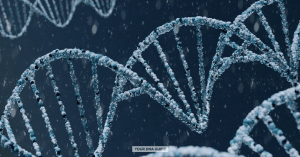Last updated: December 17, 2024
What is DNA? Here are answers about deoxyribonucleic acid and genetic testing. Use DNA tests to learn more about your family history or health. See how we can help!
The first step on your personal journey into your genes is to answer this question: What is DNA, anyway? It’s easy to be intimidated by the sciency stuff, so here’s a short and easy introduction to the world of DNA, genetic tests, and what they can tell you about YOU.
What is DNA?
DNA is stored in the nucleus (or center) of every single cell in your body. Written in your DNA is the genetic code that determines everything from the color of your hair to the shape of your eyebrows.
 You’ve probably seen a diagram of the double helix structure of DNA. That structure is made up of four building blocks called nucleotides. These nucleotides act the same way as code does for your computer or smartphone. Pairs of nucleotides can be combined in millions of different ways, which the body interprets as instructions on how certain things should be done.
You’ve probably seen a diagram of the double helix structure of DNA. That structure is made up of four building blocks called nucleotides. These nucleotides act the same way as code does for your computer or smartphone. Pairs of nucleotides can be combined in millions of different ways, which the body interprets as instructions on how certain things should be done.
Various combinations of nucleotides form genes which will determine your height, eye color, and even your shoe size! Genes can be found in your chromosomes; almost everyone has 23 pairs (one from your mother, one from your father). Approximately 99.5 percent of the DNA found in your chromosomes is completely identical to that of every other human being.
 You get half of your DNA from your mother and half from your father. Unfortunately, you don’t get to decide which parts. (Wouldn’t that be nice?) When you look at biological relatives, you can often see physical evidence of which traits seem to be handed down the most in their families.
You get half of your DNA from your mother and half from your father. Unfortunately, you don’t get to decide which parts. (Wouldn’t that be nice?) When you look at biological relatives, you can often see physical evidence of which traits seem to be handed down the most in their families.
What does DNA stand for?
DNA stands for deoxyribonucleic acid. It’s quite a mouthful! You can see why we usually just call it DNA (except for in dry scientific research papers, where it seems the longer the words, the better).
What is a genetic test?
A genetic test looks at your unique genetic material. You might take a genetic test for health reasons, if you’re looking for evidence of medical conditions or predispositions. Here at Your DNA Guide, we focus on those consumer DNA tests you take to learn more about your roots.
What kinds of DNA tests tell you about family history?
There are three different kinds of consumer DNA tests for family history. Almost everyone starts with an autosomal DNA test, which you can purchase from 23andMe, AncestryDNA, MyHeritage, Living DNA and FamilyTreeDNA (their Family Finder test).*
Which DNA test is best? Compare
Two other kinds of DNA tests can be used in a targeted way to learn more about specific parts of your family tree. Genetic males can use Y-DNA testing to learn more about their paternal line (father’s father’s father’s father, etc) Everyone inherits mtDNA from their mothers, so anyone can take an mtDNA test to learn more about their maternal lines. These tests are trickier to interpret for genealogical purposes than autosomal tests, so you’d want to learn more about them before deciding to test.
What do DNA test results look like?
Your autosomal DNA test results will include information about both sides of your biological family (your mom’s and your dad’s). Expect to find two kinds of results:
- Ethnicity estimates: an estimate of the locations and historical communities with which your ancestors on both sides of the family were associated
- DNA match list: a list of people who have tested at the same company whose DNA indicates you may be biological relatives. Your match list is most reliable for identifying relatives within the range of fourth cousins.
Who should take a consumer DNA test for family history?
 You will likely want to take a consumer DNA test for family history if you are interested in what DNA can tell you about their family origins. You may want to explore an unknown side of the family; connect with biological relatives; build your family tree; investigate an intriguing family story; or simply learn more about where your ancestors were from.
You will likely want to take a consumer DNA test for family history if you are interested in what DNA can tell you about their family origins. You may want to explore an unknown side of the family; connect with biological relatives; build your family tree; investigate an intriguing family story; or simply learn more about where your ancestors were from.
Before participating in a DNA test, be sure you are emotionally prepared for whatever the results may be. Sometimes your ethnicity results are surprising, or seem inaccurate. (Ethnicity results are still a young science.) You may find a genetic connection to people you didn’t know about. You may learn that you are not genetically connected to someone you thought you were.
When you decide you are ready to start your personal DNA journey, we’re here to help you every step of the way. Including with questions you have now, before you even take a test!
Get started with your DNA testing journey
You probably have questions about DNA testing. Like, is there any reason to avoid taking a DNA test for family history? And which test is best for MY question? We’ve got answers.





